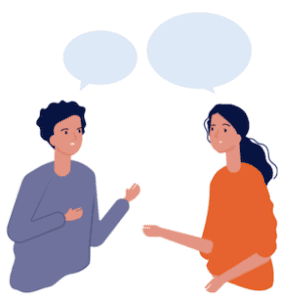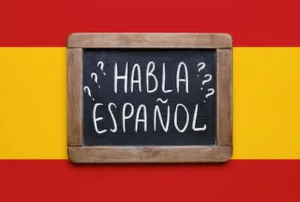 Is there an ideal age to learn Spanish?
Is there an ideal age to learn Spanish?
The ideal age to learn Spanish online or in-person is any age. All ages benefit from learning an additional language.
Instead of focusing on age, a better question to be asked is when is the ideal time to learn Spanish. In fact, today may be the ideal time. The day you start studying the Spanish language is the day when you will start reaping the benefits of learning an additional language.
Young children may have some advantages compared to adults when learning Spanish, such as acquiring a more native-like pronunciation, but adults often have more language awareness with parts of speech and word formation processes.
Adults are usually used to establishing and pursuing long-term commitments. Adults can better grasp that learning an additional language involves consistency and continuous motivation to continue through the stages of learning Spanish.
If pronunciation and a more natural approach makes learning Spanish easier for children, the focus and effort of making a commitment to study Spanish does not.
At the end of the day, all learners, regardless of age, bring to the table advantages when learning Spanish as an additional language.
What is the most effective way for beginner adults to learn Spanish?
The most effective way for adults to learn Spanish is to interact with other students in a language environment.

Interaction is the key to learning an additional language. It involves other speakers and a communicational situation needs to be present. Nowadays, the language interactive environment can be found online with an online classroom or with an online private teacher, or it can still be in the old language classroom with other peers and an instructor present.
Studying alone with books or apps such as Duolingo is not sufficient for language acquisition to take place. They can help by activating memory skills, but they do not aid very much in acquiring the implicit rules and the language patterns of Spanish.
Many linguists propose that for an additional language to be acquired, it needs to be communicated in a comprehensive and interactional way. The Spanish language classroom is one of the many settings where Spanish learners have the opportunity to interact with others to try to comprehend the Spanish language.
Another way for beginners to learn Spanish is to try to communicate with Spanish speakers while performing everyday functions such as eating at a Latin restaurant, talking to a cashier at a local Latin supermarket, or any other function that involves real interaction.
Most often adult beginners of Spanish start acquiring the language through deducing meaning first. Usually, Spanish learners start to learn Spanish by trying to make sense of the Spanish that is being produced in the classroom environment. Then, the rules of how the Spanish language works become more evident at an unconscious level and the Spanish learner starts to comprehend the Spanish Language more and more.
Beginner students of Spanish should focus at first more on the comprehension of the language than on the effort to produce a sentence in Spanish with all of its parts of speech perfectly arranged. Strong comprehension knowledge will guide Spanish learners to utter more correct sentences in the language as they progress through the stages of learning the language.
Fun Spanish learning games for beginners
One way to develop the Spanish language is to play fun games for Spanish beginners. Playing games allows for social interaction and can ease the anxiety which may lie when learning an additional language.

Games need to be engaging and stimulating for players to be active in comprehending tasks and in producing words and sentences. Pictionary is a fun game for beginners since players need to connect thoughts with visual drawings to convey words and ideas. The opportunity to draw common nouns and verbs connects words and their meanings through visual learning. Humans comprehend many aspects of the world via what they see and a lot of vocabulary can be internalized through visual games like Pictionary.
Another fun game for Spanish beginners is charades. This game makes a kinesthetic association between a phrase and its meaning. Players have to act out the meaning of a phrase without any oral guidance. This game also deals with Spanish comprehension through acting out phrases, and Spanish beginners can encode and internalize meaning by experiencing the body language involved in two ways: they can encode meaning actively by actually acting the phrases out or by observing attentively phrases being acted out by other players.
Songs for beginners to learn Spanish
Another great way for beginners to learn Spanish is to learn Spanish songs. There are many famous Spanish-speaking artists, and you can find them in a myriad of genres.
Lyrics Training has authentic songs from Spanish-speaking artists, and these songs are divided from beginner to advanced levels. All songs have lyrics and fill in the blank activities to practice listening comprehension and pronunciation as well. It is an opportunity for beginners to learn Spanish by having fun and focusing for example on the pronunciation of vowels and consonants in the Spanish language. Moreover, beginner Spanish songs can introduce Spanish learners to different Spanish accents and cultures.

Spanish beginners can not only learn Spanish through fun games and beginner songs, but they can also learn Spanish through reading beginner Spanish books. Graded Readers are really good books to begin reading in Spanish because they are made up of very frequent, colloquial words of the Spanish language. These words are present in everyday conversations and it is an opportunity for Spanish beginners to see them in the context of a story. Furthermore, Graded Readers can help Spanish beginners to develop reading comprehension and reading fluency. This means that words are not so difficult to understand in the story and they can be read at a natural pace, so the reading experience is not a strenuous one.
Good books for beginners to learn Spanish

One of the best ways to learn Spanish grammar for beginners is to do many beginning-level reading activities that have the grammar contextualized within a larger text. This is an opportunity for beginners to see for instance how verb conjugations work to convey an overall message or how verb conjugations work to agree with other phrases in the sentence to make the sentence grammatical. Spanish beginners should not beat themselves too hard if they are making mistakes with verb conjugations or with masculine or feminine agreement of noun phrases. These features of the language take time to master. Many times masculine and feminine agreement are learned on a one-to-one basis and with time the Spanish learner becomes better with this aspect of the language.
We have provided a guide for learning Spanish as an absolute beginner. Embark on this language voyage today and start reaping the benefits of studying Spanish as an additional language. The International Language Institute of Northampton, Massachusetts is the place for beginner learners of Spanish to study and excel in this exciting and beautiful language.
Our Spanish language-related course pages and articles:
- Learn Spanish Online, On-Campus or Abroad
- Top 7 reasons to learn and speak Spanish fluently in the USA
- Top methods to learn Spanish online and trends in 2022
- Improve your listening skills in 4 easy steps!
- Kathy Learning Spanish (again): Interview with a Spanish language student living in the USA
- Darlene Tells Her Story: An Interview with Darlene, a Spanish language student living in the USA
- Our top 4 destinations to learn Spanish abroad
- 4 Great Reasons Why You Should Learn Spanish in the USA

 Is there an ideal age to learn Spanish?
Is there an ideal age to learn Spanish?